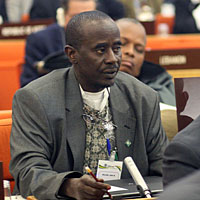
The Ministry of Forestry and the Environment has started a four-day regional conference on Article 6 of the UN Convention on climate change at the Laico Atlantic Hotel in
Officially opened on Monday, the conference plans to identify and make priorities available for possible actions, promote networking and exchange of information, and agree on common sub-regional strategies for the implementation of Article 6.
The meeting is also taking stock of the 2004 climate forum held in The Gambia.
In his keynote address on the occasion, the Minister of Forestry and the Environment, Honourable Jatto Sillah, said climate change "is downplayed" by a lot of countries, particularly in the developing world, where most of the countries are "real culprits".
Minister Sillah said Africa must push hard for unity now than ever before to ensure justice prevails, as the continent bears the scotch and silent pains of something that it does not responsible for.
"The Gambia attaches a lot of importance to the whole process of climate change, particularly Article 6 as it is expected that about 92km of our beautiful coastline will disappear as a result of climate change," he said, adding that The Gambia did not only participate in the development of the 5-year New Delhi Work programme in June 2002 but also co-chaired it with Belgium.
Hon. Sillah stressed that since 2002, The Gambia has been involved in the negotiation of Article 6 agenda items for the Africa Group, the Group of 77 and
"Therefore, it is evident that Article 6 is very dear to The Gambia," he said, adding that the Article is a very important pillar in the climate change convention, particularly for the African continent.
"As we speak, a lot of people in various countries are suffering, for example, from flood, such as
There could be "absolute water scarcity" by 2020, Hon. Sillah said. "The agriculture sector will suffer livestock loss and reduced crop yields due to drought. Food supplies will be threatened while the fishing and marine sectors will be subjected to fluctuations."
The health sector, he also noted, will be affected with water-borne diseases.
For her part, Ms Fatou Gaye, a senior climate change officer and Article 6 focal person in The Gambia, said Article 6 helps to integrate climate change activities into all sectors, particularly in education and public awareness.
She noted that the development and the implementation of Article 6 commenced at a conference held in
Ms Gaye explained that the negotiations in
She also said The Gambia would continue to raise awareness on climate change issues to promote change of attitude in order to promote the sustainable management and use of natural resources, better land use, and good agricultural practices.


